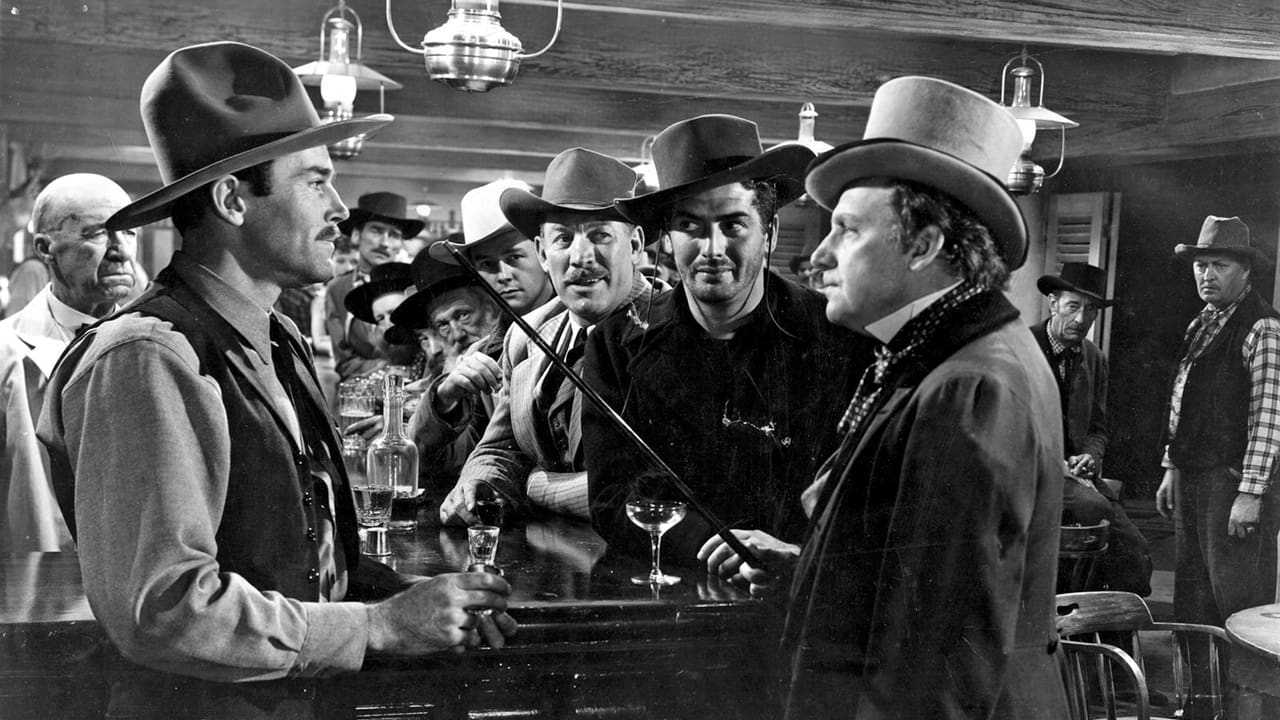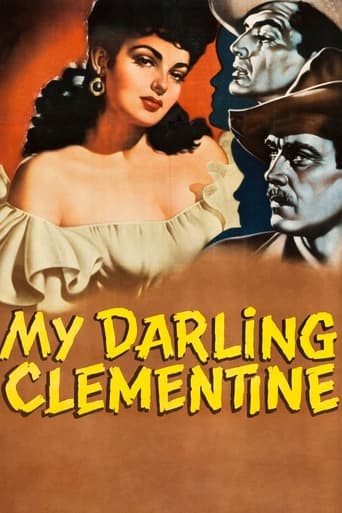

This is probably my second favorite western behind Shane and is probably in my top 25 or so overall. It has a very interesting folksy, nostalgic feel to it due largely to the cast and the black and white photography that makes the film look almost like 1880s still photos put in motion, especially the indoor scenes. The outdoor scenery is Monument Valley which is about the entire length of the state of Arizona away from the legendary town of Tombstone, but it is a whole lot more scenic than the landscape around that town, take it from someone who has been to both locations.Henry Fonda makes for a good Wyatt Earp and Walter Brennan does a fine job as the cruel elder Clanton. Victor Mature did only a fair job portraying Doc Holiday. Every time I see the movie I become a bit smitten by Clementine, i.e., actress Cathy Downs.As a side note; the movie is not exactly historically accurate, which I guess should be no surprise. For example; Contrary to what the film suggests, Doc Holiday was a dentist, not a surgeon. Morgan Earp, played by Ward Bond, survived the shootout at the O.K Corral, but did not leave Tombstone, as shown in the movie, but was shot six months later.It's not the first movie to askew accuracy for entertainment.
... View More. . . almost manages to bamboozle movie-goers that Evil is Good in MY DARLING CLEMENTINE. And this is without so much as a cameo appearance by Ford's personal Frankenstein Monster, John Wayne. Unlike Wayne's nemesis director, Frank Capra of IT'S A WONDERFUL LIFE, Ford's vision of the America he's promoting is more aptly titled IT'S A FASCIST'S PARADISE. Therefore, MY DARLING CLEMENTINE predicates ALL of its events upon the opening 1882 murder of poor Jimmy Earp, at the tender age of 18, by Evil Pops Clanton (Walter Brennan). Trouble is, as Western historian Andrew C. Isenberg documents in the definitive Criterion CLEMENTINE, James Earp was Wyatt's OLDER brother, and this Jimmy expired superannuated in 1926! The Earps were NOT cattlemen, either, as Ford would have it, and only dabbled occasionally in "law enforcement" TO PROTECT THE E^RP FAMILY PROSTITUTION AND CARD-CHEATING BUSINESSES. Like one of today's Chicago cops, it was Wyatt Earp himself who EXECUTED unarmed business rivals as a crooked "lawman." Anyone acquainted with the rest of John Ford's films (or even the Wayne flicks directed by someone else) is familiar with the pattern this mendacious pair of so-called "Hollywood Icons" used in doing their Devil's Work to tear down American Core Values and our Constitution. They were the Fox "News" of the 1900s: Unfair and Unbalanced. Though Wayne somehow missed 20th Century Fox's CLEMENTINE, one of Ford and Wayne's main henchmen--Ward Bond--plays a key Earp role here. Naturally.
... View MoreOver the years I have seen probably much of the John Ford's Westerns. I never felt a particular connection with the genre, simply I think I used to watch too much TV.One day I said to myself: gotta watch John Ford. Everybody that is someone talks about him. This is the first in a series. And it looks like a good idea.Thanks to this movie I finally got what Western is: a way to express ideas in a virtual world. It used to look so cliché. Than it look like there is no real connection with what happened in the historical West. But no, this is not about the historical West anymore than the Kurosawa historic movies are about the Feudal Japan. Some choose SciFi and dream about distant Worlds. This movie is about a virtual World. Where the good guys wear white hats. And the bad guys wear black hats. And the in-between guys change hat color without changing the model.I did not like the movie. But without John Ford I feel there wouldn't be a Dead Man.Contact me with Questions, Comments or Suggestions ryitfork @ bitmail.ch
... View MoreThe problems are not director John Ford's doing, but rather the fault of producer Darryl F. Zanuck, who has used the picture to promote Linda Darnell. So shamelessly over-exposed, in fact, is she that her character often gets in the way of the plot.Although he is not as visually appealing as Miss Darnell, Walter Brennan should have had more screen time, since he essentially plays the lead villain of the piece. Stretches of the film go by without Brennan's character present or even mentioned, so in a way there is no looming threat over the town's law and order to increase dramatic tension and make the story truly exciting.One issue, though, does seem to stem from Ford's direction. That is the way the film loses sight of its hero. About halfway into the picture, Victor Mature's Doc Holliday takes over and Henry Fonda's Wyatt Earp becomes a supporting character. This is a film about Earp, where Fonda should remain front and center. As a result, we have a decentralized protagonist and the story shifts into one that focuses more on Doc Holliday—that is, when the camera is not lingering on Darnell.
... View More